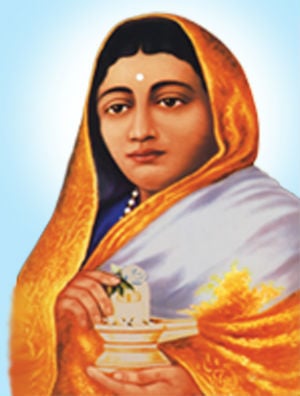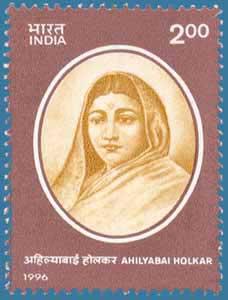31 MAY 1725-13 AUG 1795 PUNYASLOK RAJMATA AHILYABAI HOLKAR
Showing results for ahilyabai holkar jayanti legend
Search instead for ahilya bai holkar jayanti legend
Search instead for ahilya bai holkar jayanti legend
Search Results
Ahilyabai Holkar - Wikipedia, the free encyclopedia
https://en.wikipedia.org/wiki/Ahilyabai_Holkar
Maharani Ahilya Bai Holkar (31 May 1725 – 13 August 1795) was the Holkar Queen of the ... territory, stopped in Chaundi on his way to Pune and, according to legend, saw the eight-year-old Ahilyabai at the temple service in the village.Maharani Ahilyabai Holkar (1725-1795) | Hindu History - Unfolding ...
www.hinduhistory.info/maharani-ahilyabai-holkar-1725-1795/
Feb 1, 2014 - The Rajputs : Warriors of legend · 34140- ... Ahilyabai Holkar is one such figure. ... -Poem on Rani Ahilyabai Holkar by Joanna Baillie in 1849.Maharashtra govt plans to appease Dhangars, decides to celebrate ...
www.dnaindia.com/.../report-maharashtra-govt-plans-to-appease-dhangars-decides-to...
2 days ago - It has decided to celebrate the birth anniversary of Ahilyabai Holkar from ... According to the legend, Malhar Rao Holkar, a commander in the ...Punyaslok Rajmata Ahilyadevi Holkar : Queen of the Kingdom of ...
www.hindujagruti.org › history › Valiant Hindu Kings
Punyashlok Rajmata Devi Ahilyabai Holkar (31 May 1725-13 August 1795) also ... according tolegend, saw the eight-year-old Ahilyabai at the temple service in ...
You visited this page on 31/5/16.
Ahilyabai Holkar Jayanti Mahotsav - Lonely Planet
www.lonelyplanet.com › ... › Western Madhya Pradesh › Maheshwar
The birthday celebrations for the revered Holkar queen, Ahilyabai Holkar, one of India's greatest female rulers, are celebrated with particular...
Missing: legend
Deshdoot Times - Welcome to Deshdoot.com
deshdoot.com/news.php/news_details/4329260/print
Ahilyabai Holkar Jayanti celebrated ... president Santosh Gaidhani noted that legendary personalities should not be kept limited to specific caste or religion.Punyaslok Rajmata Ahilyadevi Holkar : Queen of the Kingdom of Malwa
www.forumforhinduawakening.org/...dharma/.../punyaslok-rajmata-ahilyadevi-holka...
Punyashlok Rajmata Devi Ahilyabai Holkar (31 May 1725-13 August 1795) also ... according tolegend, saw the eight-year-old Ahilyabai at the temple service in ...Fortnightly English Sanatan Prabhat: The Children's Corner
englishsanatanprabhat.blogspot.com/2016/.../punyashlok-rajmata-ahilyadevi-holkar.h...
Punyashlok Rajmata Ahilyadevi Holkar (Jayanti : 29th May) ... and, according to legend, saw the eight-year-old Ahilyabai at the temple service in the village.Ahilyabai Holkar: The Queen of Warriors - NewsGram
www.newsgram.com › History
May 20, 2016 - Ahilyabai Holkar was a strong woman and the queen of the kingdom of Malwa in Indore. ... This period of time was legendary for Indore where the government was functional and ... Previous articleHappy Narasimha Jayanti.Searches related to ahilyabai holkar jayanti legend
Kharghar, Navi Mumbai, Maharashtra - From your Internet address - Use precise location
Punyaslok Rajmata Ahilyadevi Holkar : Queen of the Kingdom of Malwa
 |
Contents
Introduction
Punyashlok Rajmata Devi Ahilyabai Holkar (31 May 1725-13 August 1795) also known as the Philosopher Queen was a Holkar dynasty Queen of the Malwa kingdom, India. She is often compared with Catherine II of Russia, Elizabeth I of England, Margaret I of Denmark. Ahilyabai was born in the village of Chaundi in Jamkhed, Ahmednagar, Maharashtra. She moved the capital to Maheshwar south of Indore on the Narmada River.
Early life
Ahilyabai was born on May 31, 1725 in the village of Chaundi, in the present-day Ahmednagar district in Maharashtra. Her father, Mankoji Shinde, was the patil of the village, a member of the proud Dhangar community. Ahilyabai's father taught her to read and write.
Her entrance on to the stage of history was something of an accident: Malhar Rao Holkar, a commander in the service of the Peshwa Bajirao and lord of the Malwa territory, stopped in Chaundi on his way to Pune and, according to legend, saw the eight-year-old Ahilyabai at the temple service in the village. Recognising her piety and her character, he brought the girl to the Holkar territory as a bride for his son, Khanderao (1723–1754). She was married to Khanderao in 1733.
A great ruler
Ahilya devi’s husband was killed in battle in 1754. Twelve years later, her father-in-law, Malhar Rao died. From 1766 until her death in 1795, she ruled Malwa, trained in both administrative and military matters by Malhar Rao. A letter to her from Malhar Rao in 1765 illustrates the trust he had in her ability during the tempestuous battle for power in the 18th century.
Already trained to be a ruler, Ahilyadevi petitioned the Peshwa after Malhar’s death, and the death of her son, to take over the administration herself. Some in Malwa objected to her assumption of rule, but the army of Holkar was enthusiastic about her leadership. She had led them in person, with four bows and quivers of arrows fitted to the corners of the howdah of her favourite elephant. The Peshwa granted permission, and, with Tukoji Holkar (Malhar Rao's adopted son) as the head of military matters, she proceeded to rule Malwa in a most enlightened manner. Ahilyadevi never observed purdah but held daily public audience and was always accessible to anyone who needed her ear.
Among Ahilyadevi's accomplishments was the development of Indore from a small village to a prosperous and beautiful city; her own capital, however, was in nearby Maheshwar, a town on the banks of the Narmada river. She also built forts and roads in Malwa, sponsored festivals and gave donations for regular worship in many Hindu temples. Outside Malwa, she built dozens of temples, ghats, wells, tanks and rest-houses across an area stretching from the Himalayas to pilgrimage centres in South India. The Bharatiya Sanskritikosh lists as sites she embellished, Kashi, Gaya, Somnath, Ayodhya, Mathura, Hardwar, Kanchi, Avanti, Dwarka, Badrinarayan, Rameshwar and Jaganathpuri. Ahilyadevi also rejoiced when she saw bankers, merchants, farmers and cultivators rise to levels of affluence, but did not consider that she had any legitimate claim to any of that wealth, be it through taxes or feudal right. She must, in fact, have financed all her activities with the lawful gains obtained from a happy and prosperous land.
A Queen taking care of her people
There are many stories of her care for her people. She helped widows retain their husbands’ wealth. She made sure that a widow was allowed to adopt a son; in fact, in one instance, when her minister refused to allow the adoption unless he was suitably bribed, she is said to have sponsored the child herself, and given him clothes and jewels as part of the ritual. To honour the memory of Ahilyadevi Holkar, in 1996 leading citizens of Indore instituted an award in her name to be bestowed annually on an outstanding public figure. The prime minister of India gave away the first award to Nanaji Deshmukh. The only time Ahilyadevi seems not to have been able to settle a conflict peacefully and easily was in the case of the Bhils and Gonds, "plunderers" on her borders; but she granted them waste hilly lands and the right to a small duty on goods passing through their territories. Even in this case, according to Malcolm, she did give "considerate attention to their habits".
Ahilyadevi’s capital at Maheshwar was the scene of literary, musical, artistic and industrial enterprise. She entertained the famous Marathi poet, Moropant and the shahir, Anantaphandi from Maharashtra, and also patronised the Sanskrit scholar, Khushali Ram. Craftsmen, sculptors and artists received salaries and honours at her capital, and she even established a textile industry in the city of Maheshwar.
The reign
"The reign of Ahilyabai, of Indore in central India, lasted for 30 Yrs. This has become almost legendary as a period during which perfect order and good Government prevailed and the people prospered. She was a very able ruler and organizer, highly respected during her lifetime, and considered as a saint by a grateful people after her death."
An English poem written by Joanna Baillie in 1849 reads:
"For thirty years her reign of peace,
The land in blessing did increase;
And she was blessed by every tongue,
By stern and gentle, old and young.
Yea, even the children at their mothers feet
Are taught such homely rhyming to repeat
"In latter days from Brahma came,
To rule our land, a noble Dame,
Kind was her heart, and tright her frame,
And Ahlya was her honoured name."
The land in blessing did increase;
And she was blessed by every tongue,
By stern and gentle, old and young.
Yea, even the children at their mothers feet
Are taught such homely rhyming to repeat
"In latter days from Brahma came,
To rule our land, a noble Dame,
Kind was her heart, and tright her frame,
And Ahlya was her honoured name."
This great ruler in Indore encouraged all within her realm to do their best, Merchants produced their finest cloths, trade flourished, the farmers were at peace and oppression ceased, for each case that came to the queens notice was dealt with severely. She loved to see her people prosper, and to watch the fine cities grow, and to watch that her subjects were not afraid to display their wealth, lest the ruler should snatch it from them. Far and wide the roads were planted with shady trees, and wells were made, and rest-houses for travellers. The poor, the homeless, the orphaned were all helped according to their needs. The Bhils who had long been the torment of all caravans, were routed from their mountain fastnesses and persuaded to settle down as honest farmers.

The stamp issued on Rajmata Ahilyadevi Holkar
|
Ahilyabai Holkar's magnificent and glorious rule ended when she passed away in 1795. In memory and honour of her greatness, the Republic of India issued a commemorative stamp on 25 August 1996. The citizens of Indore also instituted an award in her name in 1996, to be bestowed annually on an outstanding public figure, the first recipient of it being Nanaji Deshmukh.
No comments:
Post a Comment